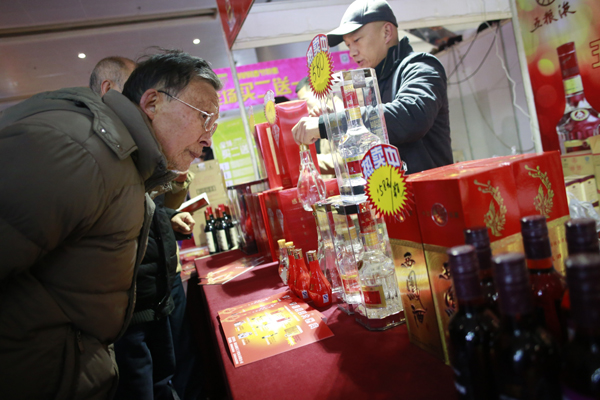 |
|
A visitor inspects liquor products at a recent wine and spirits trade fair in Wuhan, capital of Hubei province. Apart from Moutai, which saw 2 percent growth in its market value, all the shortlisted baijiu brands witnessed a significant decline in their market value in 2014. [Photo provided to China Daily] |
Baijiu industry takes greatest hit from crackdown on extravagance
Although 2015 has so far started on a relatively positive note for China's drinks industry with a slight increase in stock prices, the nation's baijiu sector remains sluggish.
Gao Jianwei, a Shanghai-based retailer of the Chinese liquor, says 2014 was a really tough year as it took him more than eight months to sell six cases of Moutai, China's national liquor.
To make ends meet, Gao says he started to sell other beverages such as soft drinks in 2014 and he has no plans to stock Moutai this year.
"It is hard to tell how this year will turn out for the baijiu industry. Even though Spring Festival is around the corner and demand may rise a little, it is too early to tell if the entire industry will pick up this year. It is much safer to sell something which has a consistent market demand," he says.
In the Most Valuable Chinese Brands List 2014 released by Hurun Report, a total of 16 wine and Chinese liquor brands were shortlisted, accounting for 5 percent of all the brands included in the list, down 2 percentage points year-on-year.
Even though baijiu brands still accounted for the majority of all the shortlisted wine and spirits brands, three brands were eliminated from the list in 2014 due to the stagnancy of the entire baijiu industry due to the central government's crackdown on extravagance.
Sluggish market
Apart from Moutai, which saw 2 percent growth in its market value, all the shortlisted baijiu brands witnessed a significant decline in their market value in 2014. Fenjiu Group's market value dipped to the greatest extent-42 percent to 3.4 billion yuan ($547 million), while JNC Group Co Ltd dropped 39 percent to 2.2 billion yuan.
International brands in China were also affected last year. SABMiller Plc, the world's second-largest brewer, reported an unexpected drop in its third quarter beer volume, with the company seeing a 9 percent slump in China, one of its biggest markets.
Wine retailers' sales also took a hit in 2014 from the crackdown on extravagance. Tian Yu, general manager of Shanghai-based wine merchant Euro Shop, says that retailers targeting government consumption may have seen their sales drop by as much as 80 percent in 2014. But she says that the silver lining on the wine market's cloud is that ordinary consumers are still willing to shell out on wine, especially in the run-up to holidays such as the upcoming Spring Festival.
